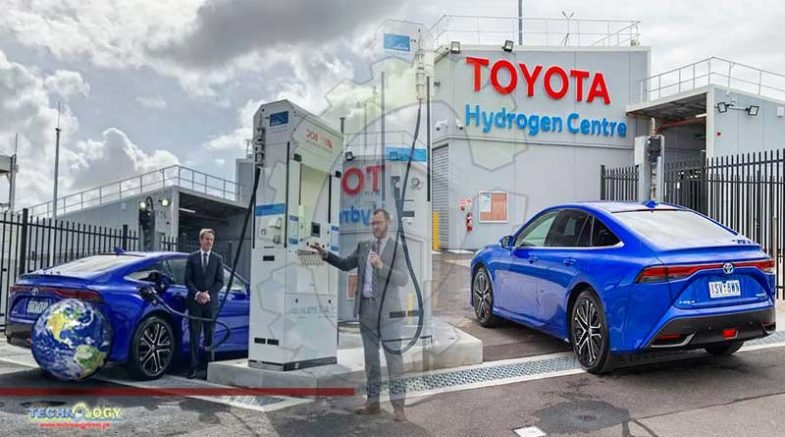Toyota Australia has unveiled a hydrogen production facility and refueling station at its decommissioned car factory in Altona, Melbourne.

Toyota Australia has unveiled a hydrogen production facility and refueling station at its decommissioned car factory in Altona, Melbourne, ahead of the arrival in Australia of its second-generation fuel-cell car, the Mirai FCEV.
The facility includes a 200-kilowatt electrolyser powered by an on-site 84-kilowatt solar array and a 100-kilowatt battery.
The electrolyser has the capacity to make 80 kilograms of hydrogen per day, enough to fill only around 14 Toyota Mirais, which will arrive in Australia in April.
The centre also includes a stationary fuel cell that can be used to generate electricity to power the site. The $7.37 million facility was built with a $3.04 million investment from the Australian Renewable Energy Agency (ARENA).
Toyota is pitching the centre as the “first commercial refueling station in Victoria”, and given the scarcity of hydrogen refueling options, it is under no illusions about demand. Instead, it is promoting it as an early-stage testing ground for hydrogen technology.
Toyota Australia chief executive Matthew Callachor said it was Toyota Australia’s “first serious step into the hydrogen area of automotives”.
He said the new Mirai would not be on general sale in Australia, and would most likely be leased to organisations with large fleets and an interest in lowering their emissions.
The launch comes just days after the ACT government opened Australia’s first publicly available hydrogen refueling station, to keep its fleet of 20 Hyundai Nexo hydrogen vehicles topped up.
While most accept green hydrogen will play a significant role in a low carbon world, particularly in areas like steelmaking, ammonia manufacture, and possibly some larger commercial vehicles, its role in powering passenger vehicles is highly contested.
Earlier this month, Volkswagen chief executive Herbert Diess dismissed the idea that fuel cell cars could ever compete with battery electric vehicles. Tesla boss Elon Musk has repeatedly dismissed fuel cell technology in passenger cars.
Asked where he stood on the battery-electric vs fuel cell debate, Matt Macleod, head of future technologies at Toyota Australia, insisted both could have a place.
“From Toyota’s perspective, we’re not focusing on fuel cells, we’re focusing on zero emissions,” he said.
“It’s too early to choose which zero-emissions technology is either best or preferred. We should be embracing all the technologies in order to achieve any sustainability goals. There are benefits and challenges with both technologies.”
He said the “distinct advantage” of fuel cell over battery EVs was the ability to fill up the tanks in three to five minutes, though he said the ability to charge at home gave battery EVs an edge. He didn’t address the fact that battery EVs are much cheaper to run than either hydrogen or petrol cars – less than a quarter of the price of petrol cars in Australia, according to the Electric Vehicle Council.
Asked how much it would cost to fill up the new Mirai, Macleod said it would “depend on where you are”.
“The cost of hydrogen can be generated for relatively low amounts if there is a source of renewable energy. The costing model that we would look at is something that’s comparable to petrol or diesel in the short-term, and then making improvements to reduce the costs.”
He said in markets where hydrogen refueling was more readily available – not Australia – the cost was in the region of $50 to $60. In the case of the Mirai, that would allow you to drive up to 650 kilometres before having to refuel. That would mean if you tried to drive north from Altona to the only other publicly available hydrogen refueling station, in Canberra, you’d probably run out of gas just as you were turning off the highway.
Callachor said the cost of refueling a Mirai in Australia would likely be included in the lease package.
In Japan, the Mirai sells for a minimum of around 7.1 million yen, or around $A94,000. Toyota currently has no pure battery electric vehicles on sale in Australia.
Toyota launched its first-generation Mirai in 2014 and has since sold around 10,000 of them.
Originally published at The Driven
